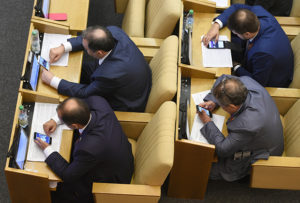
The idea of creating a special messenger for officials has been discussed not for the first year, and the need to develop a protected service for civil servants is quite obvious. The government is not without reason afraid of working correspondence in foreign services, since they do not always have the necessary confidentiality parameters.
That is why at the end of May the Ministry of Economic Development supported a ban on working correspondence in foreign messengers for Russian officials and military. Earlier, Prime Minister Dmitry Medvedev signed a decree recommending the training of information security civil servants. This will increase their level of technical literacy and avoid possible information leaks until the Russian service is fully implemented.
They also tried to restrict the communication of officials in messengers in the State Duma. In November 2015, such a bill was submitted by the Communist Party deputy Vadim Soloviev. He wanted to prohibit technical means “which can be used for unauthorized access to confidential or proprietary information”.
However, today foreign services are not officially banned. Many officials, by their admission, correspond in the Telegram. On the other hand, in a number of state institutions, foreign messengers cannot be used according to internal regulations.
For example, in the Ministry of Communications and Mass Media – as the head of department Nikolai Nikiforov repeatedly reminded. According to him, violation of service instructions may even serve as a reason for initiating a criminal case.
In addition, despite all their apparent convenience, the most popular services still do not comply with the requirements of the law on personal data and store all information about Russian users abroad. In particular, this is the case in the Facebook-owned WhatsApp messenger and founded by Pavel Durov Telegram. Only Viber agreed to transfer the data to Russia.
That is why at the end of May the Ministry of Economic Development supported a ban on working correspondence in foreign messengers for Russian officials and military. Earlier, Prime Minister Dmitry Medvedev signed a decree recommending the training of information security civil servants. This will increase their level of technical literacy and avoid possible information leaks until the Russian service is fully implemented.
They also tried to restrict the communication of officials in messengers in the State Duma. In November 2015, such a bill was submitted by the Communist Party deputy Vadim Soloviev. He wanted to prohibit technical means “which can be used for unauthorized access to confidential or proprietary information”.
However, today foreign services are not officially banned. Many officials, by their admission, correspond in the Telegram. On the other hand, in a number of state institutions foreign messengers cannot be used according to internal regulations.
For example, in the Ministry of Communications and Mass Media – as the head of department Nikolai Nikiforov repeatedly reminded. According to him, violation of service instructions may even serve as a reason for initiating a criminal case.





